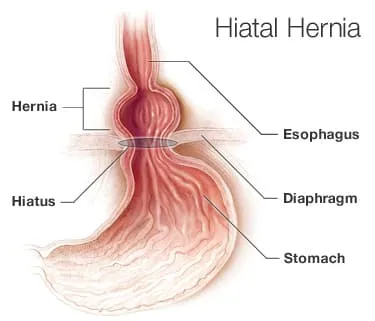Many people with hiatal hernia, a condition in which part of the stomach bulges upward through an opening in the diaphragm, have no symptoms. For those who do, what they eat may make a difference between a good day (or night) and a bad one. Diet can play an important role in controlling the symptoms of hiatal hernia, namely heartburn and acid indigestion.

When you have a hiatal hernia, it is easier for stomach acids to come up into the esophagus, the tube that carries food from your throat to your stomach. This causes a burning feeling in your throat and chest. Certain foods can make these symptoms worse for some people. Fortunately, heartburn symptoms associated with hiatal hernia often can be controlled with diet and lifestyle changes.
Hiatal Hernia: Foods That May Cause Symptoms
The following foods are highly acidic or may weaken the lower esophageal sphincter, making it easier for stomach acids to back up into your esophagus. They may cause heartburn symptoms.
- Citrus foods, such as oranges, grapefruits, and lemons, and orange juice, grapefruit juice, cranberry juice, and lemonade
- Chocolate
- Fatty and fried foods, such as fried chicken and fatty cuts of meat
- Garlic and onions
- Spicy food
- Peppermint and spearmint
- Tomato-based foods such as spaghetti sauce, pizza, chili, salsa, and tomato juice
- Coffee, tea (including decaffeinated versions), and alcohol
- Carbonated beverages
- Dairy products, such as whole milk, ice cream, and creamed food. Try soy milk; it may be a good milk substitute. Also, mild cheeses, like feta or goat, may be enjoyed in moderation.
- Oil and butter
Hiatal Hernia: Foods That Are Less Likely to Cause Symptoms
The following foods are low-acid-producing foods and are less likely to aggravate your hiatal hernia symptoms:
- Bananas and apples
- Green beans, peas, carrots, and broccoli
- Grains, like cereals (bran and oatmeal), bread, rice, pasta, and crackers
- Low-fat or skim milk and low-fat yogurt
- Fat-free cheeses, cream cheese, and fat-free sour cream
- Lean meat, chicken, and fish
- Water
- Pretzels, graham crackers, rice cakes, and baked potato chips
- Low-fat sweets (no chocolate or mint)
You may find that some of the foods listed under "foods to avoid" may not bother you, while others on the "foods to enjoy" list may cause discomfort. Everyone tolerates food differently. To determine the best diet for you, keep a food diary for a few weeks. And then avoid anything that causes you to have symptoms.
Hiatal Hernia: Cooking Tips
A good way to enjoy the foods listed above is to cook them in a healthy way. Here are some heartburn-friendly cooking tips:
- Choose lean meats, such as skinless chicken, meat with little visible fat, ground turkey instead of ground beef, and fish. Lean beef cuts include round, chuck, sirloin, or loin. Lean pork cuts include tenderloin or loin chop.
- Bake or broil foods instead of frying.
- Skim off fat from meat during cooking.
- Go easy on seasoning. Most seasonings are OK as long as they are not spicy but should be used in moderation.
- Substitute low-fat dairy foods, such as low-fat yogurt, for ice cream.
- Steam your vegetables with water only.
- Limit butter, oils, and cream sauces. Use cooking spray instead of cooking oil when sautéing.
- Choose low-fat or nonfat ingredients over full-fat products.
- Get creative. There are all kinds of ways to modify recipes. Don't be afraid to try new things.
Hiatal Hernia: Lifestyle Tips
In addition to making adjustments to what you eat and how you cook, changing certain habits may lessen heartburn symptoms too, including:
- Do not overeat. Instead, eat small, frequent meals. And take your time. Eating fast can make heartburn symptoms worse.
- Avoid lying down or going to sleep for at least three hours after a meal.
- Do not bend over right after eating.
- Do not smoke.
- Lose weight, if necessary.
- Wear loose-fitting clothes so as to not add extra pressure on your stomach.
- Raise the head of your bed 6 to 8 inches with wood blocks or some other sturdy objects. Propping your head up with pillows probably won't give you the relief you need.
If these diet and lifestyle tips don't help, or you need additional relief, over-the-counter antacids and acid-reducing or blocking drugs may help control your heartburn symptoms. Talk to your doctor to learn more about over-the-counter or prescription medications to treat your symptoms. Surgery may be needed in rare cases.
Hiatal hernia symptoms can be bothersome. But most people feel better after they adjust their diet and lifestyle.
